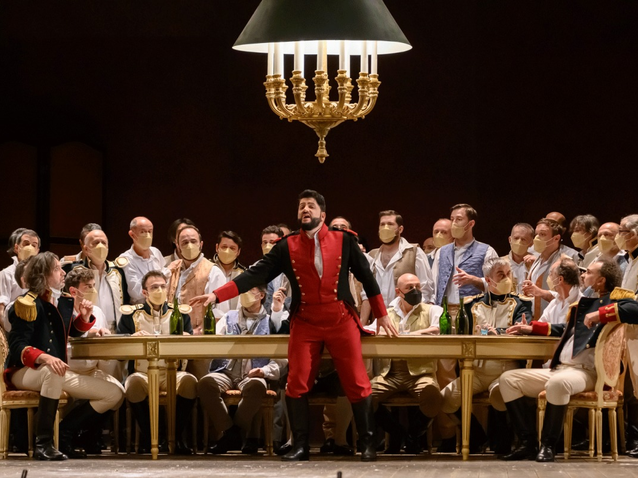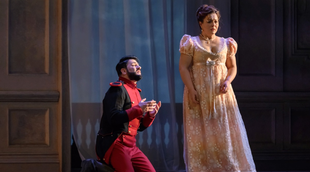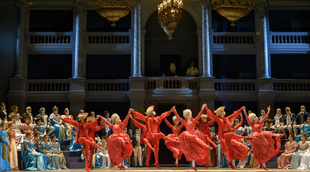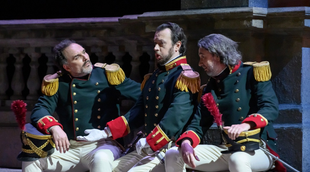 © dr
© dr
In January 1992 Liceu presented a new production for Pikovaya Dama, a relatively infrequent opera in the Barcelona stage despite being one of the best Tchaikovsky operas. At that time, it was unanimously considered to be one of the most luxurious productions the theatre had ever done. In 2003 and 2010 it made the stage again and now, thirty years after its premiere, it has once more come back to Liceu – a rare event for an operatic production.
Pikovaya Dama operates in two registers, in two levels. On one hand, as requested by the Mariinsky theatre in Saint Petersburg where the opera was due to be premiered, the piece takes the extreme shape of a French grand opéra, with an abundance of characters, more or less historical scenes (it even includes Catherine the Great, thankfully in a silent character), great choral scenes and ballet.
Modest Tchaikovsky, the composer’s brother and author of the libretto, satisfied all the demands from the Mariinsky theatre’s director, but with great intelligence and ability managed to also maintain intact, in a second more underlying level, all the strength of the brief novel with the same title by Alexander Pushkin on which the opera is based. A ghastly tale, sinister and full of horror, that goes much beyond a simple case of ludopathy or ambition presents an antihero, Hermann, who aims to govern and force his own destiny through gambling, which ends up turning him into a demonic character who eventually plunges into self-destructive madness.
The production of Pikovaya Dama at Liceu, signed by Gilbert Deflo as stage director, has the same merits as the skilful libretto by Modest Tchaikovsky: it works very well in both of the piece’s registers. The sumptuous costumes as well as the costly and well-crafted scenography by William Orlandi, with the added spectacular lighting by Albert Faura, maintain the grand opéra register. Yet, the in crescendo underground level that begins to emerge and develops into a dominant feature in the final scenes, also works perfectly thanks to an insightful and sensitive stage direction that deepens the characters.
Musically, this Pikovaya Dama achieved a rather good level, with conductor Dmitri Jurowski debuting at Liceu. This penultimate opera by Tchaikovsky is a piece with rich musical resources from a mature and wise composer. Jurowski kept the sound well ordered, with the orchestra well balanced between the different sections, but there were some initial timing problems with the voices. Jurowski could have aimed for a warmer, more intense and wilder expressivity, as the piece allowed it. However, his expressively contained option must be considered one valid possibility.
Hermann, the dramatic protagonist of the opera, one of the most exhausting roles in the repertoire as he is always on stage, was performed by Yusif Eyvazov, a specialist in this character. Eyvazov is an authentic vocal athlete, with a powerful voice and able to sustain an imponent projection up until the last scene. The timbre isn’t particularly pretty, and he has a propensity towards stentorian singing rather than prioritising the melody and the legato. However, his Hermann has the ‘look of madness’ required by the character.
Lisa, dramatically a very passive character that serves essentially to explain the path towards Hermann’s madness, is also musically very demanding. It was interpreted by Lianna Haroutounian, replacing Sondra Radvanovski, who cancelled the performance due to a family bereavement. With a powerful and very well projected voice, Haroutounian delivered a good style Lisa that worked better in the important solo interventions than in the duets with Eyvazov.
Lena Belkina performed with a very good and melodious voice and with great legato lines the two characters of Polina and Milvozor. The Countess, a very important character dramatically speaking as she concentrates all the sinister and dark aspects of the piece, was performed with great musical and dramatic results by Elena Zaremba, the same mezzosoprano who interpreted Polina in the 2010 performances.
Rodion Pogossov did a generally good Prince Yeletsky. His role though contains one of the most beautiful arias by Tchaikovsky for a deep male voice, "Ya vas lyublyu", only comparable to Gremin’s area in Ievgueni Onieguin. Pogosov performed it well but more was expected of his opportunity to shine. Łukasz Goliński interpreted well his two characters Count Tomsky and Zlagotor and honoured his beautiful aria of the last scene.
The choir started quite badly in the first scene but ended excellently in the final a cappella number, which although is meant to be soldiers, sounded as if sung by authentic Russian monks.
Xavier Pujol
Gran Teatre del Liceu. Barcelona, 26th January 2022
Pikovaya Dama by Pyotr Ilyich Tchaikovsky. Yusif Eyvazov, tenor. Lianna Haroutounian, soprano. Elena Zaremba, mezzosoprano. Łukasz Goliński, baritone. Rodion Pogossov, baritone. Lena Belkina, mezzosoprano. David Alegret, tenor. Mercedes Gancedo, soprano. Ivo Stanchev, bass. Antoni Lliteres, tenor. Marc Sala, tenor. Dimitar Darlev, bass. Mireia Pintó, mezzosoprano. Gemma Coma-Alabert, mezzosoprano. Orchestra and Choir of Gran Teatre del Liceu. conductor, Dmitri Jurowski. Stage director, Gilbert Deflo. Scenography and costumes, William Orlandi. Lighting, Albert Faura. Choreography, Nadejda Loujine. Production by Gran Teatre del Liceu.
the 31 of January, 2022 | Print



Comments